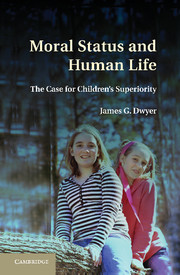Book contents
- Frontmatter
- Contents
- Introduction
- 1 What Is Moral Status and Why Does It Matter?
- 2 How Is Moral Status Determined?
- 3 Selecting Criteria of Moral Status
- 4 Problems in Applying a Multicriteria Approach
- 5 Applying a Multicriteria Moral Status Test to Adults and Children
- 6 Legal, Policy, and Moral Implications of Children's Superiority
- Conclusion
- Bibliography
- Index
3 - Selecting Criteria of Moral Status
Published online by Cambridge University Press: 10 November 2010
- Frontmatter
- Contents
- Introduction
- 1 What Is Moral Status and Why Does It Matter?
- 2 How Is Moral Status Determined?
- 3 Selecting Criteria of Moral Status
- 4 Problems in Applying a Multicriteria Approach
- 5 Applying a Multicriteria Moral Status Test to Adults and Children
- 6 Legal, Policy, and Moral Implications of Children's Superiority
- Conclusion
- Bibliography
- Index
Summary
Chapter 2's account of how we characteristically attribute moral status to beings provides a basis for generating a list of candidates for criteria of moral status. We can look for evidence that particular traits of other beings cause us to identify empathically with them, that particular traits in ourselves generally form the basis of moral claims we make on our own behalf, and that particular characteristics of entities inspire awe or disgust in us. There are many places one might look for such evidence, including one's own experience and others' expression of their experience in narrative or art. I will focus in the first instance, though, on the philosophical literature relating to moral status, on the assumption that scholars who have explicitly analyzed the topic have identified at least some of the criteria on which human moral agents commonly predicate moral status.
Most philosophical writing that touches on moral status is not directly or ultimately concerned with moral status per se; it does not aim to develop a comprehensive account of the necessary and sufficient conditions for having moral status generally or even to demonstrate the relevance to moral status of a particular property in the abstract. Rather, discussion of grounds for attributing moral status appears most often in tracts advocating (and occasionally opposing) social policies more protective of particular entities – for example, advocating for animal welfare or stronger environmental laws.
- Type
- Chapter
- Information
- Moral Status and Human LifeThe Case for Children's Superiority, pp. 61 - 130Publisher: Cambridge University PressPrint publication year: 2010



